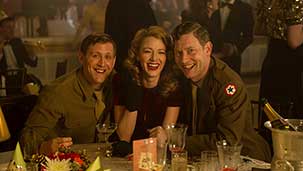Are you a fan of wildlife programs? You know, the kind where a herd of gazelles lazily sips at a watering hole while a lioness prepares to pounce, all while David Attenborough’s soothing voice runs a play-by-play of the grisly proceedings? Age of Adaline shares a few similarities with those classic zoological telecasts: it’s expertly photographed, the creatures and landscapes are gorgeous, and your sonorous voice provides context to the action. And like those nature programs, Age of Adaline provides very little in the way of character development or dramatic tension. The difference is, we usually have more of a reason to root for the gazelle than the simple fact that she’s pleasing to look at.
And Blake Lively is most certainly easy on the eyes. As Adaline, Lively isn’t just ageless—she’s timeless. She emanates old Hollywood glamour, completely at ease in every era in which the film takes place. Unfortunately, she is not in a vintage Chanel ad, where being aloof, chilly and opaque are acceptable qualities. She’s supposed to be in a modern romantic fairy tale. But it’s unfair to lay all the blame at Blake’s lovely feet. For a movie about a woman who has lived for more than a hundred years, it’s disappointing – and more than a little bit baffling – that Adaline is so lacking in dimension.
Born in 1906, Adaline led a normal life...until the age of 29 when her car plunged into a frigid river and was then struck by lightning. She survived, but she was unable to age. In present day San Francisco, she falls for a man named Ellis, who turns out to be the son of William, a man she had a fling with in London in the Sixties. She now must face the truth about her circumstances or risk losing yet another chance at love.
We learn about Adaline’s backstory through the three laziest screenplay devices available: old newsreel footage (that she watches because she works at a library), flashbacks, and narration (no offense). This is when we’re introduced to your authoritative voice. You describe Adaline’s first few years in a historical context: a newspaper declaring her as the first baby born on New Year’s Day 1906, the Great San Francisco earthquake and fire, the building of the Golden Gate Bridge where she meets her husband, an engineer who perishes during construction, leaving her a young widowed mother. And then you continue Adaline’s curious backstory ten months after the death of her husband when she drives her car off a snowy road and into the river.
When an external narrator is used well, it gives the audience a sense of remove, an objectivity (think Magnolia or Little Children). In Age of Adaline, your job is purely expository. Instead of allowing Adaline to tell her own life story (and in the process, provide the opportunity for some much needed character development), the filmmakers instead decide to give you the task of explaining her preposterous plight. As Adaline plunges into the chilly water, you explain the pathology of anoxic shock, combined with head injury and the defibrillating properties of being struck by lightning which, when combined, leads to agelessness.
You then go on to tell us how Adeline spent years trying to make sense of her medical predicament, while making up excuses for her inability to age. In the Fifties a traffic cop questions Adeline’s age, and then the FBI gets involved (because, communism!), and she goes on the run, leaving behind her now college-aged daughter. Flash-forward to present day and she’s fallen for Ellis, a quasi-stalker with scruffy hair, who loves history and drives a late-model Saab despite the fact he’s a millionaire (which is apparently shorthand for “endearing Mr. Right-type”).
You get a break when the film is turned over to the veterans. Ellen Burstyn as Adaline’s daughter Flemming, Harrison Ford as William, and Kathy Baker as his wife. They manage to navigate the stray plot threads gamely and elevate the script’s sappiness. Ford seems more invested than he has in years, and he and Baker provide most of the film’s genuine laughs. A special mention should go to newcomer Anthony Ingruber for his uncanny portrayal of young William. With his adorably spot-on grimacing, he almost manages to out-curmudgeon Harrison Ford. But it’s Ellen Burstyn who steals every scene she’s in, believably playing “younger” than Lively’s Adaline. She’s so convincing that it’s a shame the writer’s didn’t give her the narration job (again, no offense). That might have given the film the depth and warmth that your bystander perspective just couldn’t provide (no offense, really).
When you return in the third act, you’re describing another car careening on a slippery road in a snow storm. But at this point we’re expecting it. Unfortunately, since we’ve never learned about Adaline’s hopes or desires, or who she really is beyond the obvious, your narration might as well have been done by Charlie Brown’s teacher, because by that point, all I could hear was, “wha, wha, wha, wha, wha, wha…”
Really, seriously, no offense.
Talk soon?
Di







